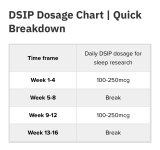DSIP, EPI, KPV, Ta-1/Thymulin.
For tough sleep issues, insomnia, circadian rhythm disruption etc, often the short, low mcg protocols won't be of much help. Longer protocols and higher dosing are usually more effective. I have all those sleep issues.
I started with DSIP, settled around 200mcg-300mcg, taken a couple of hours before I want to sleep, has helped me get much deeper sleep, but DSIP won't help get you to sleep faster. I used it nightly for 3 months, and will cycle back onto it when I need it.
A week after I began DSIP, I started EPI, and started there at 300mcg, went as high as 1mg over the course of 3 months, but 300-500mcg was the right dosing for me. With Epi, I tried it first mid-day, some it energizes, some it makes tired. It energized me, so I took it in the AM until I no longer felt it energizing me and moved it to PM, usually an hour or so after DSIP.
When I cycled off DSIP, I kept the Epi and added in KPV - lots of benefits with that pep, as with Epi, and I like that combo a lot.
When I cycled off Epi recently, I kept the KPV and when I finish my current vial, I will be trying Pinealon and either DSIP or another pep I am forgetting.
I also mixed what I call the KPV Glow - I didn't much like KPV in the ghk-cu/bpc-157/tb500(4) in part b/c the KPV and BPC-157 are in ways duplicative, but I do like the new vial I blended of ghk-cu, GHK Basic, KPV. And use that early evening. Helps as well with my sleep.
Over the course of the 3 months, I find I'm actually getting tired earlier, and my sleep anxiety has largely abated, and I'm falling instantly and deeply asleep. Even if I wake during the night, which I usually do, I'm able to fall back to sleep either instantly or within a very short time, when before I'd be up for hours.
Yesterday, to avoid getting sick I decided to start an immunity protocol of TA-1/Thymulin which runs 10-14 days, TA-1 1.5mg and THY 1mg nightly. Pinned separately. I slept very well last night using those and eager to see if it holds true tonight


